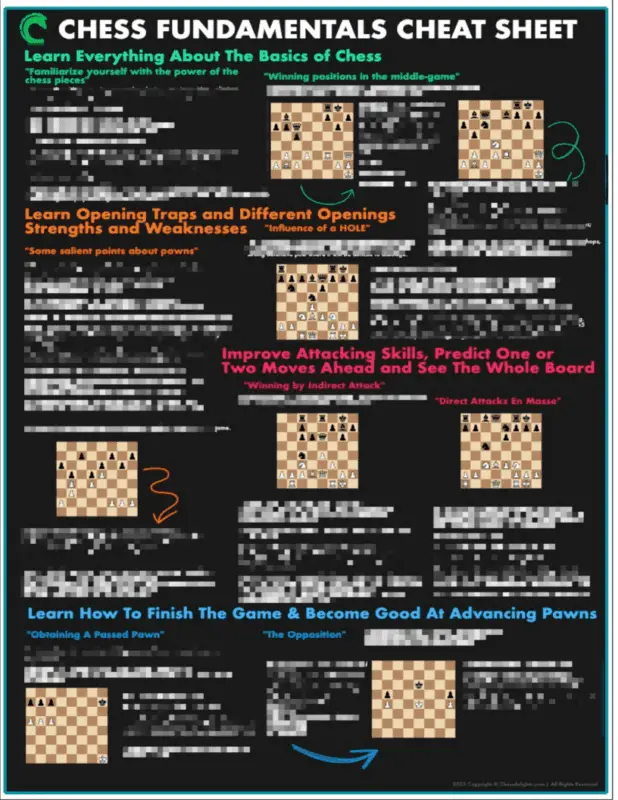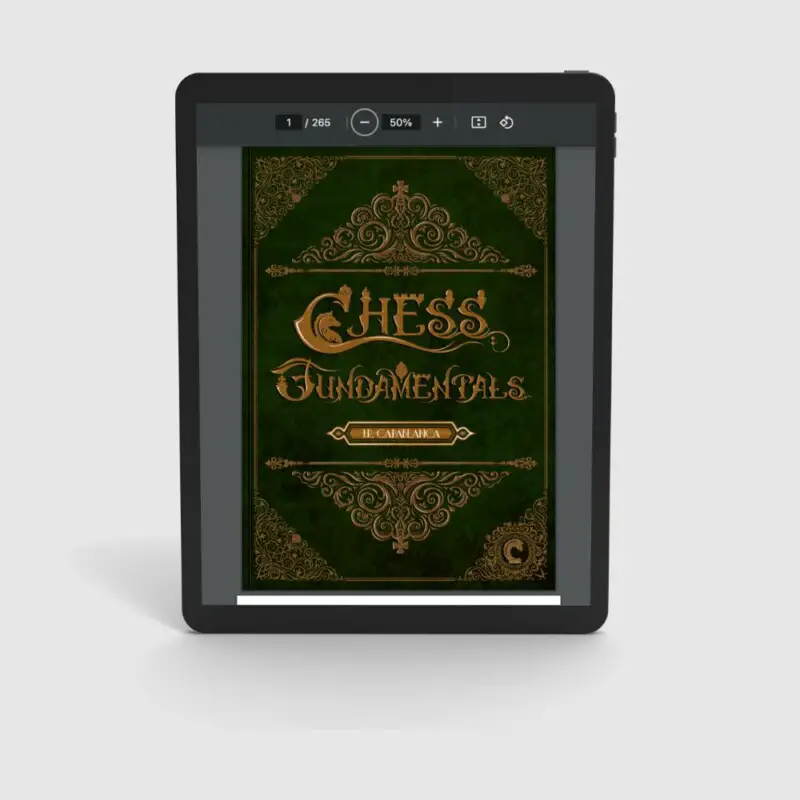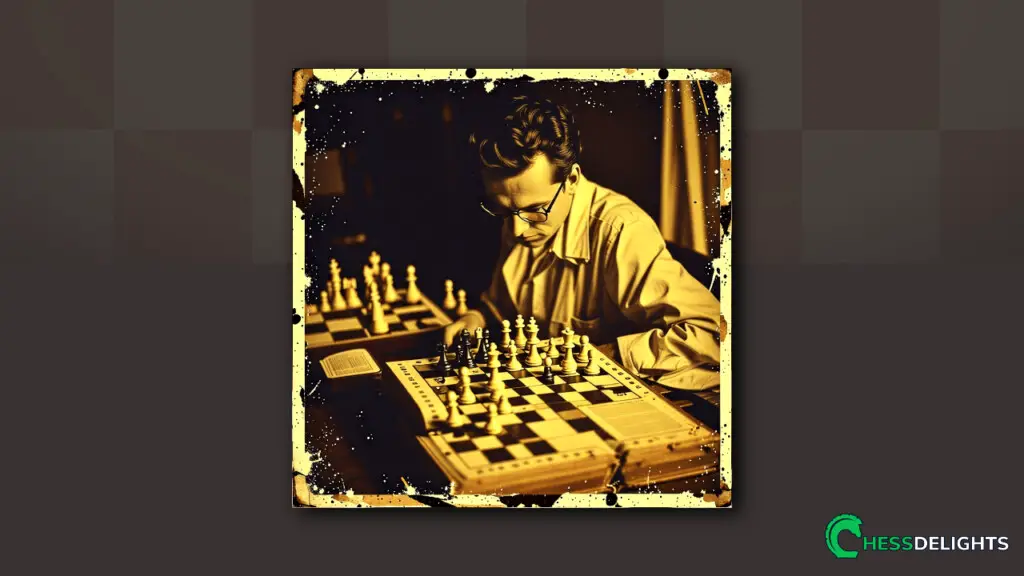I’ve spent hours reading and reviewing chess books about our beloved game…
…and,
…one particular book that has been a constant companion on my chess journey is ‘Chess Fundamentals' by José Capablanca.
This classic text, penned by the third World Chess Champion himself, is renowned in chess circles for its timeless wisdom.
I think it's a great guide for anyone who wants to get better at chess, and I want to share my thoughts on it with you!
In this blog post, we're going to delve into the depths of this masterpiece, dissect its value, and determine if it still holds up in the modern chess landscape.
Whether you're a beginner or an experienced player, stick around, and let's explore together this cornerstone of chess literature.
Table of Contents
The Historical Significance of ‘Chess Fundamentals' by Capablanca
José Capablanca, the author of ‘Chess Fundamentals', was a Cuban chess player who held the World Chess Championship title from 1921 to 1927.
He is often considered one of the greatest players in the history of the game, renowned for his exceptional endgame skill and speed of play.
In ‘Chess Fundamentals', he offers deep insights and analyses grounded in years of experience at the highest level of competition.
The book is not just a tutorial but a historical artifact that provides a unique perspective on the game from a world champion.
For example, Capablanca's emphasis on positional play and endgame strategy reflects the prevailing chess wisdom of his time, making the book an important historical document as well as a practical guide.
Recommended Reading: If you want to know how to learn chess from books, read this article.
Understanding Chess Through Capablanca's Eyes
Reading ‘Chess Fundamentals' provides the reader with the opportunity to see the game through the eyes of a grandmaster.
The book is structured in a way that allows readers to follow Capablanca's thought processes, understand his strategies, and learn from his experiences.
For instance, in the chapter on pawn structure, Capablanca meticulously explains his thought process in evaluating and exploiting weaknesses in the opponent's pawn formation.
This intimate insight into a grandmaster's thinking helps not only to improve one's chess skills but also to develop a deeper appreciation for the intricacies of the game.
Recommended reading: If you want to read more about what chess books to read first, check out this article.
The Strengths of ‘Chess Fundamentals' by Capablanca
‘Chess Fundamentals' by José Capablanca is a comprehensive guide that covers a range of topics that can help anyone looking to improve their chess tactics.
The book's strength lies in its systematic approach to the game of chess.
It starts with the basic principles of chess, such as the importance of controlling the center and developing pieces, and gradually moves on to more complex strategies, like pawn structure and tactical themes.
This makes it a valuable resource for players at varying skill levels.
For instance, a beginner can learn the fundamental concepts of the game, while an intermediate player can gain knowledge on more intricate strategies.
The book's step-by-step approach is particularly helpful in building a strong foundation for understanding the game and progressively improving.
For example, the book explains the concept of ‘pawn chains,' where a series of pawns protect each other, with one example demonstrating how this strategy could be used to secure a solid defensive structure.
The Value of Practical Examples in ‘Chess Fundamentals'
One of the key aspects that set ‘Chess Fundamentals' apart is the inclusion of numerous examples and games, all dissected and explained by Capablanca himself.
These practical examples serve as a great learning tool as they allow players to see the strategies in action, thereby enhancing their understanding and application of the concepts.
This approach to learning is particularly beneficial as it provides a real-world context to the theoretical concepts discussed in the book.
For instance, in one of the examples, Capablanca discusses a game where he used the ‘pawn chain' strategy to secure a win.
This example clearly illustrates how the strategy can be applied in a real game situation.
Self-paced Learning with ‘Chess Fundamentals'
‘Chess Fundamentals' employs a pedagogical approach that encourages self-paced learning.
Each chapter builds on the previous one, which allows players to solidify their understanding of each topic before moving on to the next.
This method caters to different learning styles and paces, making the learning process more flexible and personalized.
For example, a player who has just started learning chess might spend more time on the initial chapters that cover the basic principles, while a more advanced player could quickly move on to the chapters that discuss complex strategies.
Recommended reading: If you want to learn the must read chess books for every type of player, check out this article.
The Shortcomings of ‘Chess Fundamentals'
Despite its strengths, ‘Chess Fundamentals' has some shortcomings.
The book delves into advanced concepts quite quickly, which can be challenging for beginners.
Additionally, it is not a light read – it requires concerted effort and practice to fully absorb and understand the concepts.
This means that it may not be suitable for casual players or those looking for a quick introduction to chess.
For example, a novice player might find the rapid transition from basic principles to complex strategies overwhelming and confusing.
The Importance of End-Game Strategy in ‘Chess Fundamentals'
‘Chess Fundamentals' provides a comprehensive coverage of end-game strategy, which is a crucial aspect of chess.
However, it could have included more examples to make the strategies easier to grasp and apply.
The end game, where few pieces are left on the board, often determines the outcome of a match, making it a critical area of study for any serious player.
For instance, the book might have benefited from including more examples of ‘pawn promotion' scenarios, a common theme in the end game.
Recommended reading: If you're looking for the best book that teaches the principles of chess written by a former World Chess Champion – check this article now!
The Education Value of ‘Chess Fundamentals'
‘Chess Fundamentals' is not just a chess guide, it is also an effective tool for honing critical thinking and problem-solving skills.
The depth and complexity of the book challenge the reader to think analytically and strategically. Each chapter presents a new concept or strategy, followed by a series of illustrative examples and puzzles to solve.
This approach encourages active learning and helps the reader to develop skills that are transferable to many aspects of life.
For example, the focus on strategic planning in chess can be applied to areas such as business strategy or project management.
The Lasting Impact of ‘Chess Fundamentals' on My Chess Game
Since reading ‘Chess Fundamentals', I have noticed a significant improvement in my own chess performance.
Capablanca's detailed analysis of different game situations and his explanations of various strategies have enhanced my understanding of the game.
I find myself applying his strategies in my games, such as his advice on maintaining pawn structure and exploiting small advantages.
This has resulted in a noticeable improvement in my ability to control the board and secure victories.
‘Chess Fundamentals' as a Must-Read for Chess Enthusiasts
For anyone serious about improving their chess skills, ‘Chess Fundamentals' is an indispensable resource.
Its in-depth analysis, practical examples, and insightful strategies provide a wealth of knowledge.
While it may be challenging to fully absorb the book's content, the payoff in terms of improved understanding and performance in chess is undeniable.
As a testament to its enduring relevance, the strategies and principles outlined in ‘Chess Fundamentals' are still widely studied and applied in modern chess training.
Our Popular Product
Limited Offer ChessDelights Edition of Jose Raul Capablanca's Chess Fundamentals Book PDF
Now: $4.99 Only Regular Price: $6.99
My Overall Thoughts on ‘Chess Fundamentals' by Capablanca
In summary, ‘Chess Fundamentals' by José Capablanca is a valuable resource for anyone serious about improving their chess skills.
Although it's not beginner-friendly and requires dedicated effort to fully understand, the depth of information and practical examples it offers is unparalleled.
It is a book that demands time and patience, but the rewards it offers in terms of enhanced understanding and improved performance in chess make the effort worthwhile.
Reflecting on my journey, I can confidently say that the book has significantly improved my understanding and performance in chess.
Recommended reading: If you want to learn more about books that teaches positional plays, read this article.








